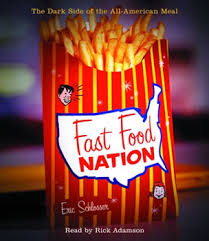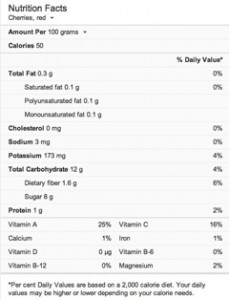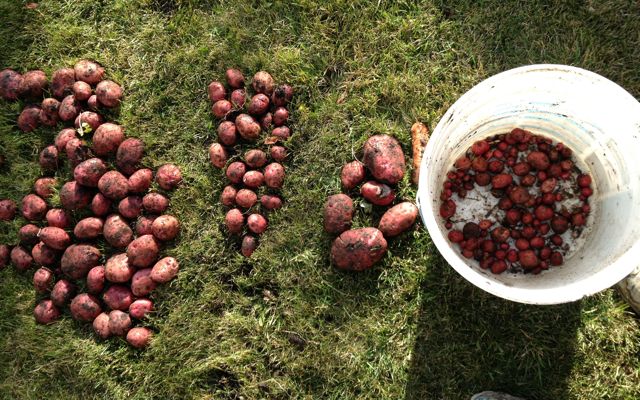 “What the All-American Meal is doing to the World”
“What the All-American Meal is doing to the World”
Fast Food Nation is a shocking expose’ on the various players in our food supply system
A glaring problem is that a handful of gigantic corporations control most of the links of our food chain, from seed grain to fertilizers and pesticides to feedlots to meat processing plants.
The book closely examines the relationship between big food companies like McDonald’s and their suppliers. The author also explores the large government regulators like USDA and FDA and their influence on the nutrition and safety of the food in the USA
McDonald’s corporation is the largest customer of beef and potatoes. Therefore they heavily influence their suppliers as well as government agencies.
As with all publicly traded companies, fast food companies are motivated by quarterly profits and immediate Return on Investment. Pressure is always on to improve efficiency and lower costs.
That leads to many problems, among them compromised animal rights, human rights, and the health of consumers.
The system is geared to churn profits and can’t seem to slow down to ensure the health of farm and plant workers who are routinely exposed to harmful chemicals, hazardous conditions, risking limbs and ultimately their lives.
The most powerful statement in the book comes at the end of a section on meat. After examining several e-coli outbreaks, why they happened and how the industry reacted the author concludes that the bottom line is “There’s shit in the meat.”
Not to mention human body parts and rats. Some will claim “bullshit!” I say, “Exactly!”
I believe it’s true. I once worked in a supermarket. The ladies who worked in the meat department never bought the hamburger. They always bought chuck or blade roasts and ground them into ground beef. They obviously knew something.
For several years I have purchased beef directly from a farmer I know. When I’m out of “good” meat and I’m forced to buy it in the store, I can hardly stand to cook the hamburger, never mind eat it. It stinks!
The book tells how conditions in packing plants are often inhumane both to animals and humans. The big processing companies pay politicians to pass laws so they can police themselves. Since this book was published, laws have been proposed to make it a criminal offense for journalists or anybody else to take photographs of or report on the conditions on factory farms and at processing facilities.
The cry of the big industry players is “We’ll police ourselves. Don’t worry! But you can’t check up on us. Trust us!” And their friends in government say “okay” and turn a blind eye.
What are the solutions?
I’ve long agonized over the sources of food for my family. I grew up on a mixed farm where we raised our own beef, pork, chicken, goose, duck, turkey, eggs, vegetables and berries, in addition to the grain we grew to feed our animals and for sale. We ate nothing from a package.
When you grow up eating whole real food, factory food doesn’t taste right. Several years ago I learned to make my own salad dressings. Now I can’t eat dressing from a bottle. It tastes like chemicals. I find most restaurant food too salty, too greasy and tasting like chemicals.
It’s not feasible for us all to have our own sources of all the foods we enjoy. But there are ways we can get back control over our food.
The best is to grow your own food. When you plant, weed, water and harvest before you wash, slice and cook and eat it, you have a real connection to and vested interest in your food.
Granted, gardening isn’t for everyone but if you have a patch of grass in your yard, it’s easy to dig it up and throw in a few potatoes, tomatoes, salad stuff, green beans, beets, carrots, zucchini etc. Most of these vegetables practically grow themselves. It’s a small step towards controlling your food.
Learn how to prepare your own whole, real food and keep it simple. I am astounded by the hoards of people who are helpless when it comes to feeding themselves; that’s why there is a market for factory food.
Another option is to seek relationships with local growers, especially for meat, since we can’t have chickens or a steer in our city backyards. You might find local growers online or at farmer’s markets, although most of our markets are not populated with local farmers but the same wholesalers that supply the supermarkets. Community Supported Agriculture (CSA) groups are popping up all over the continent.
Choose organic options wherever possible. It’s tough to do. Big industrial food companies regularly buy out small organic producers so they can get in on the growth of the organic sector. Unfortunately, they industrialize them, bastardizing organic principles and misleading their customers.
For example a recent report by the Cornucopia Institute exposed cereal manufacturers, claiming natural and organic, but when their products were tested, they were found to contain genetically modified organisms, which are not organic, and other so-called natural ingredients that don’t belong in organic foods. See link below.
As consumers we need to read books like Schlosser’s Fast Food Nation to inform ourselves. Once we’re informed we can notify politicians that we want responsible oversight of our food system. Let them know our food should be nutritious, safe, and ethical, not merely profitable.
Mostly, you can vote with your dollars. McDonald’s made exactly zero dollars from me last year, as did all the other fast food outlets. General Mills, Coca-Cola, and other food manufacturers also made no profit from me.
http://cornucopia.org/cereal-scorecard/docs/Cornucopia_Cereal_Report.pdf
http://en.wikipedia.org/wiki/Fast_Food_Nation
http://en.wikipedia.org/wiki/Fast_Food_Nation_(film)
Learn more by searching Google for Factory Farms
 Cherry season says summer. And it’s here now!
Cherry season says summer. And it’s here now!

